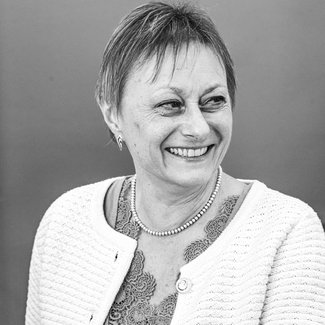
As Edge’s Director of Research I am afforded many exciting opportunities, but few can compete with a recent visit to Cuba to learn more about this unique country’s approach to skills development. In March 2024, I joined academic colleagues from Stockholm University, UCL Institute of Education, and the University of Magdeburg to participate in a four-day conference hosted by the University of Pinar del Rio, approximately 146km southwest of Havana.
Through numerous seminars and presentations, we came together to share international perspectives and research findings related to work-based learning. The visit also provided a valuable insight into the adaptability and resilience of VET systems operating under Cuba’s distinct political and economic model. The conference itself was a fascinating experience. It had excellent turnout and we received thoughtful questions from an academic community that was clearly eager to develop its international ties. Because only a limited number of the audience spoke English, we had to conduct the seminars through interpreters. This was a novel experience in its own right, and certainly tightened up our communication!
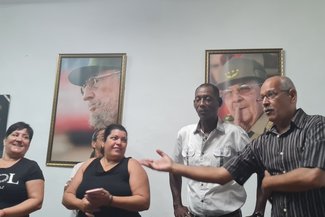
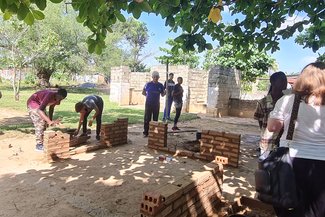
Alongside the conference, a key highlight of the visit was an observational trip to a local vocational school that offered training programmes in construction, agriculture, hospitality, automotive technology, and informatics. Despite operating under severe resource scarcity due to the longstanding US trade embargo and loss of Soviet financial support in the early 1990s, the school demonstrated remarkable ingenuity and pragmatism in its delivery of skills training. We went to a bricklaying workshop, where we saw students using a sand-based mortar to build practice walls and then dismantle them. The bricks could then be rinsed and reused – a pragmatic solution borne out of necessity. Meanwhile, the carpentry facilities, while lacking in modern equipment and materials, clearly fostered an environment of active engagement and enthusiasm among the learners.
It might be that the school we visited was an unusual case – during our visit, we learned that they had received financial support from a Swiss charity, providing much-needed additional resources. However, this funding was concluding without continuation in place. Nevertheless, the structure of Cuba’s skills system seemed cleverly shaped to balance their needs and capacity. To facilitate ongoing skills development, the Cuban VET system uses a sequential, integrated model of vocational pathways. For the courses we saw at the vocational school, the system enables learners to become qualified worker after two years, middle technicians after three years, young people can go on to pedagogical training, obtain a teaching certificate and start teaching after four years. This means qualified professionals can be teaching their trade to others, in many cases while they are still in their late teens. This may seem unorthodox by our standards but it addresses the shortage of vocational instructors and, presumably, a lack of available resources to deliver dedicated teacher training courses.
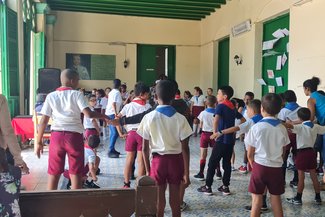
The restrictions in Cuba were immediately apparent to an outsider. As tourists exploring Pinar del Rio and the cobblestoned streets of Trinidad, I saw beautiful places but also a society struggling with severe shortages and rationing. Yet, it is also clear that Cuba has an entrenched cultural ethos that values education as a driver of social progress. It became apparent to me that it was this mindset, as much as necessity around resource constraints, that drives their determination to innovate with what little they have available. As my Cuban colleagues explained, this ethos is deeply ingrained in the national psyche. On top of this, their centralised practices also find roots in the structure of VET systems from former Soviet Bloc nations.
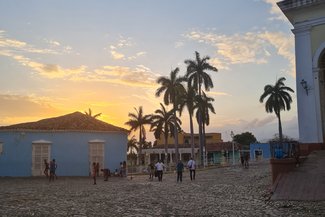
Cuba’s commitment to delivering high-quality VET was evident across our interactions. All the learners we met exuded pride in their work and showed a keen desire to share their experiences with us. Perhaps most interestingly, local policymakers – who joined us on our visit to the vocational school – clearly had close ties to the vocational school and the university staff members. This was apparent from the way they communicated with one another. Once again, whether this was particular to Pinar del Rio, or if this developed system of communication applies across Cuba is hard to say. But it was good to see and certainly different from our own context.
Cuba’s unique socio-economic and political landscape makes any comparison with our own system problematic. Our context in the UK differs greatly from theirs. However, Cuba’s core principles of pragmatic problem-solving, leveraging cultural values to drive educational priorities, and fostering progressive systems of training are good lessons for the development of robust and responsive VET frameworks wherever in the world they are. We were inspired by the ingenuity and adaptability of everyone we met.
This year, Edge celebrates its 20th anniversary. As we continue to promote high-quality technical and professional learning, this experience is a powerful reminder to me of education’s ability to uplift individuals and communities, even in the most challenging of times. As we look forward to the next 20 years I hope that, here in the UK, we can proceed with as much determination and optimism as our Cuban counterparts.

